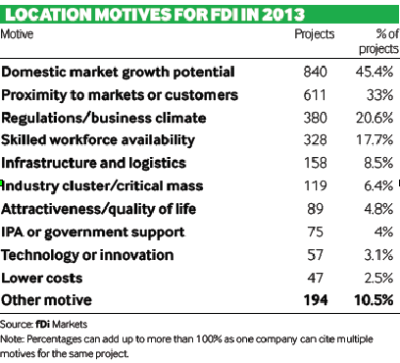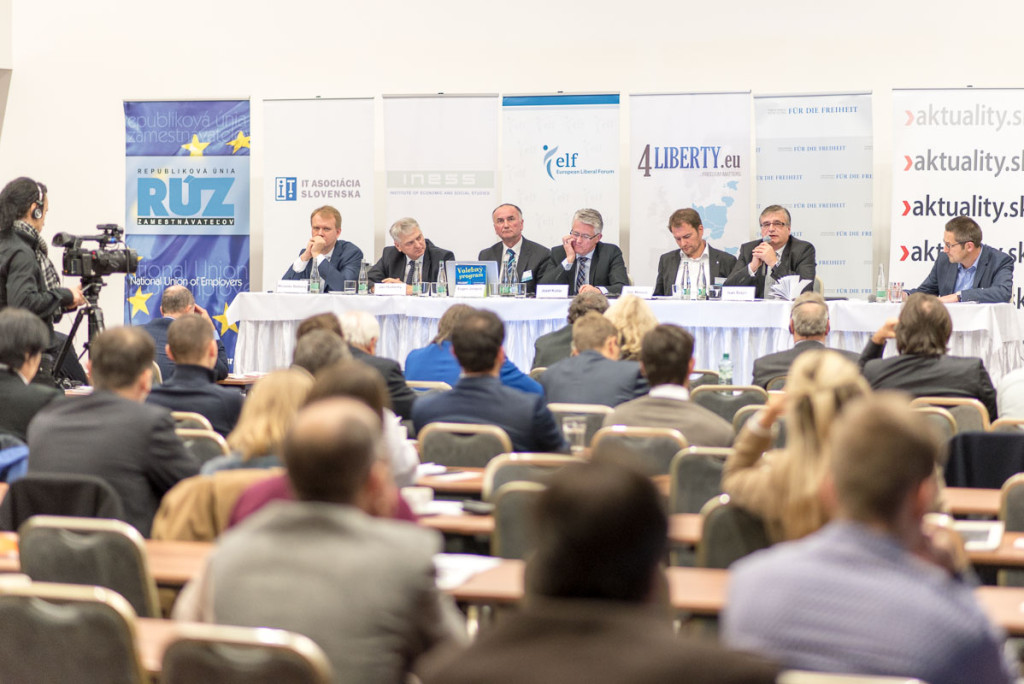Hundreds of experts focus on the causes and analysis of economic growth, whole university departments search for correlations and dream about causalities which would become easy guidelines for wealth growth. It is not easy to select three names, which would be widely recognized in this field. We’ve decided to use a different approach during the preparation of the Competitiveness conference – we identified countries, which generated attention during the recession. We were able to gather foreign experts from United Kingdom, Denmark, and Lithuania behind the speakers’ table. Greece could not be missing as well. The expert panel was completed by the presence of previous Slovak Minister of finance and current advisor to Ukrainian reformers, Ivan Mikloš.
After the official welcome delivered by Jürgen Martens, Member of Board, European Liberal Forum, and Richard Ďurana, Director, INESS, the expert panel took place. The following text contains interesting excerpts from their presentations.
Martin Agerup (CEO, CEPOS, Denmark, powerpoint presentation)
At the beginning of his speech, CEPOS President attacked the popular myth of Denmark being rich thanks to the welfare state. As he demonstrated on number of charts, Denmark was first rich, and only then could afford the welfare state. However, welfare state is not contributing to the growth of Danish wealth, which is losing compared to the „old“ 12 developed EU countries since 70-ties (blue line) and compared to USA (red line) (Value 1 on the vertical represents equal wealth per capita, data from Maddison/OECD).
 Despite still being considered a wealthy country, stagnation wasn’t politically sustainable and problems coming from the lack of market motivations were proliferating. The same scenario was happening in Sweden, so Scandinavia should be given as an example of pro-market reforms, which are happening since the end of 70-ties. For example, the corporate tax rate fell from 50 % to 23.5 %. The value of private pension savings is currently 15 % of annual pension expenditures.
Despite still being considered a wealthy country, stagnation wasn’t politically sustainable and problems coming from the lack of market motivations were proliferating. The same scenario was happening in Sweden, so Scandinavia should be given as an example of pro-market reforms, which are happening since the end of 70-ties. For example, the corporate tax rate fell from 50 % to 23.5 %. The value of private pension savings is currently 15 % of annual pension expenditures.
 Denmark attracts attention especially because of its flexible labor market. Low unemployment rate is interesting especially because average unemployment lasts only 3 months. Employer on the Danish labor market does not have to explain the reasons behind his decision to lay off an employee, as it is in Slovakia. Dissatisfaction with employee’s productivity, or staff reduction is fully sufficient. Many would consider such arrangements too cruel, but the employer is facing the same threat – an employee can leave the employer without giving a reason. Labor market, where majority can find a job within three months is therefore pretty busy. Each year, 300,000 new jobs are created. People change jobs every 6-7 years on average.
Denmark attracts attention especially because of its flexible labor market. Low unemployment rate is interesting especially because average unemployment lasts only 3 months. Employer on the Danish labor market does not have to explain the reasons behind his decision to lay off an employee, as it is in Slovakia. Dissatisfaction with employee’s productivity, or staff reduction is fully sufficient. Many would consider such arrangements too cruel, but the employer is facing the same threat – an employee can leave the employer without giving a reason. Labor market, where majority can find a job within three months is therefore pretty busy. Each year, 300,000 new jobs are created. People change jobs every 6-7 years on average.
Martin Agerup finished his presentation with a catchy quote: “You can have capitalism without welfare state, but you cannot have welfare stat without capitalism.”
Raoul Ruparel (Co-director, Open Europe, United Kingdom, powerpoint presentation)
Expert from the renowned British think-tank (whose ex-director is currently advisor to the Prime Minister David Cameron and to large extent shapes the tone of discussion about potential Brexit) demonstrated on several charts how higher flexibility in the labor market enabled quick return to the pre-crisis level of employment. As it can be seen in the chart, missing labor market reforms were holding the rest of Europe back and thus the UK has today employment rate higher by massive 8 percentage points than the Eurozone.
 Return to the high employment rate would not be possible without supporting self-employed, or without implementing new kind of employment contracts (resembling work-agreement contracts in Slovakia). Important positive effect was brought also by the real wage slump of 4 % decline compared to pre-crisis levels. Mr. Ruparel considers stagnation of labor productivity, which has not reached pre-crisis levels yet, as the challenge and imperfection of the recovery in the UK.
Return to the high employment rate would not be possible without supporting self-employed, or without implementing new kind of employment contracts (resembling work-agreement contracts in Slovakia). Important positive effect was brought also by the real wage slump of 4 % decline compared to pre-crisis levels. Mr. Ruparel considers stagnation of labor productivity, which has not reached pre-crisis levels yet, as the challenge and imperfection of the recovery in the UK.
 Žilvinas Šilėnas (President, LFMI, Lithuania, powerpoint presentation)
Žilvinas Šilėnas (President, LFMI, Lithuania, powerpoint presentation)
Žilvinas Šilénas placed competitiveness and economic freedom into conjunction. Not only Hong Kong or Singapore, but also the Scandinavian countries boast their wealth thanks to doing business easiness, effective contract enforcing, or respect of the property rights.
Mr. Šilénas used a poll to illustrate the fact that after economic fundaments (product demand, client proximity) quality of regulation and business environment is the most important. Unlike the economic fundaments, the regulation and business environment can be directly influenced by governments and states.
Aristides Hatzis (law and economy professor, University of Athens, Greece, PDF presentation)
Aristides Hatzis is a potent writer who runs six blogs (for example greekcrisis.net), contributes to the world’s most respected dailies and lectures on the University of Athens. Using the tragic reality of Greece competitiveness rankings, he demonstrated the inability of Greek government to start economic growth. In his presentation, he showed that competitiveness is not only the issue of formal rules, but also of informal rules, which are considerably different compared to those in Germany or Netherlands.
Another obstacle in the way of economic recovery is the ineffectiveness of social system, which offers too high share of the benefits to high income citizens – three times more than the lowest income quintile.
 Ivan Mikloš (former Minister of Finance, independent Slovak MP, Chief Advisor to the Minister of Finance of Ukraine and an Advisor to the Minister of Economic Development and Trade of Ukraine.)
Ivan Mikloš (former Minister of Finance, independent Slovak MP, Chief Advisor to the Minister of Finance of Ukraine and an Advisor to the Minister of Economic Development and Trade of Ukraine.)
Ivan Mikloš evaluated premises and process of adopting reforms, which boosted Slovak competitiveness in the recent decade. During his presentation he stressed, that reforms are not a technical problem, because guidebooks and technical capacities are plentiful. Reforms are especially a political problem, especially a lack of political leaders, who would be able to push for unpopular reforms and defend them.
The expert panel was chaired by Radovan Ďurana of INESS.
After the expert panel the political panel took place. Six political leaders presented specific measures in three selected areas prior the parliamentary elections held in March 2016:
1. Contract enforcement and small creditors’ protection (slow courts and judicial system, secondary financial insolvency, creditors’ protection, Commercial and Civil code).
2. Transformation of the country into technology leader not only in private but also in public sector (problem of lacking IT experts) – Industry 4.0, ineffective education in this field, how to achieve systemic improvement of IT procurement in public sector, how to modify e-government.
3. Other important measures for improvement of the competitiveness of Slovak economy.
The political panel was chaired by Ján Orlovský, Director of the Open Society Foundation.
Individual political parties were represented by:
Igor Matovič, Chairman, OĽaNO
Miroslav Beblavý, Vice-Chairman, SIEŤ
Ján Hudacký, Vice-Chairman, KDH
Ivan Švejna, Vice-Chairman, Most-Híd
Eugen Jurzyca, MP, SaS
Jozef Kollár, MP, SKOK
Why is high competitiveness, which is one of the prerequisites for economic growth, important for every country, was explained in the final remarks by INESS Director Richard Ďurana: With 7 % annual GDP growth rate, a country doubles its wealth every 10 years. The same takes 24 years with 3 % growth and 35 years with 2 % growth. Would you like to be wealthier, or not?
The international conference Competitiveness – A Word without Meaning? was organized on 25 November 2015 in Bratislava by INESS and European Liberal Forum.
All presentations and videos can be reached on this conference’s website link.















